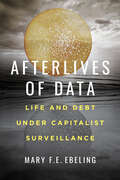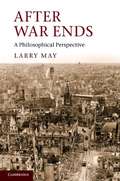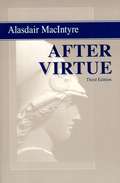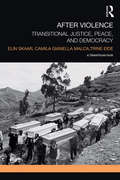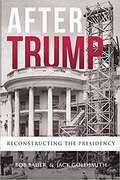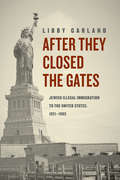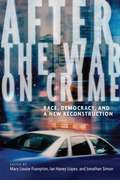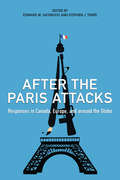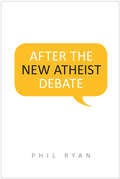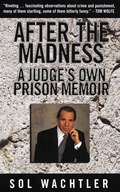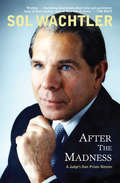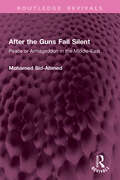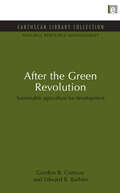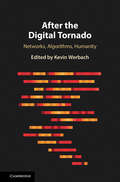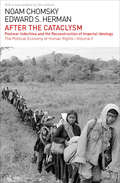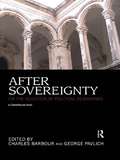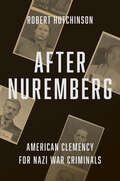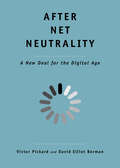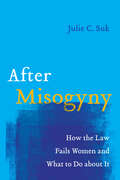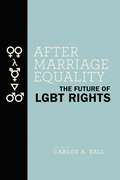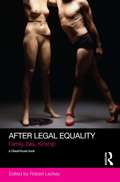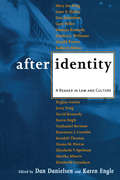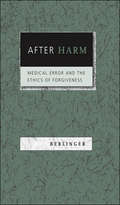- Table View
- List View
Afterlives of Data: Life and Debt under Capitalist Surveillance
by Mary F.E. EbelingWhat our health data tell American capitalism about our value—and how that controls our lives.Afterlives of Data follows the curious and multiple lives that our data live once they escape our control. Mary F. E. Ebeling's ethnographic investigation shows how information about our health and the debt that we carry becomes biopolitical assets owned by healthcare providers, insurers, commercial data brokers, credit reporting companies, and platforms. By delving into the oceans of data built from everyday medical and debt traumas, Ebeling reveals how data about our lives come to affect our bodies and our life chances and to wholly define us.Investigations into secretive data collection and breaches of privacy by the likes of Cambridge Analytica have piqued concerns among many Americans about exactly what is being done with their data. From credit bureaus and consumer data brokers like Equifax and Experian to the secretive military contractor Palantir, this massive industry has little regulatory oversight for health data and works to actively obscure how it profits from our data. In this book, Ebeling traces the health data—medical information extracted from patients' bodies—that are digitized and repackaged into new data commodities that have afterlives in database lakes and oceans, algorithms, and statistical models used to score patients on their creditworthiness and riskiness. Critical and disturbing, Afterlives of Data examines how Americans' data about their health and their debt are used in the service of marketing and capitalist surveillance.
After War Ends
by Larry MayThere is extensive discussion in current Just War literature about the normative principles which should govern the initiation of war (jus ad bellum) and also the conduct of war (jus in bello), but this is the first book to treat the important and difficult issue of justice after the end of war. Larry May examines the normative principles which should govern post-war practices such as reparations, restitution, reconciliation, retribution, rebuilding, proportionality and the Responsibility to Protect. He discusses the emerging international law literature on transitional justice and the problem of moving from a position of war and possible mass atrocity to a position of peace and reconciliation. He questions the Just War tradition, arguing that contingent pacifism is most in keeping with normative principles after war ends. His discussion is richly illustrated with contemporary examples and will be of interest to students of political and legal philosophy, law and military studies.
After Virtue: A Study in Moral Theory (3rd edition)
by Alasdair MacintyreIn this classic work, Alasdair MacIntyre examines the historical and conceptual roots of the idea of virtue, diagnoses the reasons for its absence in personal and public life, and offers a tentative proposal for its recovery.
After Violence: Transitional Justice, Peace, and Democracy
by Elin Skaar Camila Gianella Malca Trine EideAfter Violence: Transitional Justice, Peace, and Democracy examines the effects of transitional justice on the development of peace and democracy. Anticipated contributions of transitional justice mechanisms are commonly stated in universal terms, with little regard for historically specific contexts. Yet a truth commission, for example, will not have the same function in a society torn by long-term civil war or genocide as in a society emerging from authoritarian repression. Addressing trials, reparations, truth commissions, and amnesties, the book systematically addresses the experiences of four very different contemporary transitional justice cases: post-authoritarian Uruguay and Peru and post-conflict Rwanda and Angola. Its analysis demonstrates that context is a crucial determinant of the impact of transitional justice processes, and identifies specific contextual obstacles and limitations to these processes. The book will be of much interest to scholars in the fields of transitional justice and peacebuilding, as well as students generally concerned with human rights and democratisation.
After Trump: Reconstructing The Presidency
by Bob Bauer Jack GoldsmithIn After Trump: Reconstructing the Presidency, Bob Bauer and Jack Goldsmith provide a comprehensive roadmap for reform of the presidency in the post-Trump era.In fourteen chapters they offer more than fifty concrete proposals concerning presidential conflicts of interest, foreign influence on elections, pardon power abuse, assaults on the press, law enforcement independence, Special Counsel procedures, FBI investigations of presidents and presidential campaigns, the role of the White House Counsel, war powers, control of nuclear weapons, executive branch vacancies, domestic emergency powers, how one administration should examine possible crimes by the president of a prior administration, and more. <P><P>Each set of reform proposals is preceded by rich descriptions of relevant presidential history, and relevant background law and norms, that place the proposed reforms in context. All of the proposals are prefaced by a chapter that explains how Trump--and, in some cases, his predecessors--conducted the presidency in ways that justify these reforms.After Trump will thus be essential reading for the coming debate on how to reconstruct the laws and norms that constitute and govern the world’s most powerful office.It’s hard to imagine two better co-authors for the task. Both served in senior executive branch positions—in the administrations of Barack Obama and George W. Bush, respectively—and have written widely on the presidency.Bob Bauer served from 2010-2011 as White House Counsel to President Barack Obama, who in 2013 named Bauer to be Co-Chair of the Presidential Commission on Election Administration. He is a Professor of Practice and Distinguished Scholar in Residence at New York University School of Law, as well as the co-director of its Legislative and Regulatory Process Clinic.Jack Goldsmith served as Assistant Attorney General, Office of Legal Counsel from 2003-2004, and Special Counsel to the Department of Defense from 2002-2003. He is the Learned Hand Professor at Harvard Law School, co-founder of Lawfare, and a Senior Fellow at the Hoover Institution. Together, in this book, they set the terms for the national discussion to come about the presidency, its powers, and its limits.
After They Closed the Gates: Jewish Illegal Immigration to the United States, 1921-1965
by Libby GarlandIn 1921 and 1924, the United States passed laws to sharply reduce the influx of immigrants into the country. By allocating only small quotas to the nations of southern and eastern Europe, and banning almost all immigration from Asia, the new laws were supposed to stem the tide of foreigners considered especially inferior and dangerous. However, immigrants continued to come, sailing into the port of New York with fake passports, or from Cuba to Florida, hidden in the holds of boats loaded with contraband liquor. Jews, one of the main targets of the quota laws, figured prominently in the new international underworld of illegal immigration. However, they ultimately managed to escape permanent association with the identity of the OC illegal alienOCO in a way that other groups, such as Mexicans, thus far, have not. Ina"After They Closed the Gates, a"Libby Garland tells the untold stories of the Jewish migrants and smugglers involved in that underworld, showing how such stories contributed to growing national anxieties about illegal immigration. Garland also helps us understand how Jews were linked to, and then unlinked from, the specter of illegal immigration. By tracing this complex history, Garland offers compelling insights into the contingent nature of citizenship, belonging, and Americanness. "
After the War on Crime: Race, Democracy, and a New Reconstruction
by Jonathan Simon Mary Louise Frampton Ian Haney LopezSince the 1970s, Americans have witnessed a pyrrhic war on crime, with sobering numbers at once chilling and cautionary. Our imprisoned population has increased five-fold, with a commensurate spike in fiscal costs that many now see as unsupportable into the future. As American society confronts a multitude of new challenges ranging from terrorism to the disappearance of middle-class jobs to global warming, the war on crime may be up for reconsideration for the first time in a generation or more. Relatively low crime rates indicate that the public mood may be swinging toward declaring victory and moving on.However, to declare that the war is over is dangerous and inaccurate, and After the War on Crime reveals that the impact of this war reaches far beyond statistics; simply moving on is impossible. The war has been most devastating to those affected by increased rates and longer terms of incarceration, but its reach has also reshaped a sweeping range of social institutions, including law enforcement, politics, schooling, healthcare, and social welfare. The war has also profoundly altered conceptions of race and community.It is time to consider the tasks reconstruction must tackle. To do so requires first a critical assessment of how this war has remade our society, and then creative thinking about how government, foundations, communities, and activists should respond. After the War on Crime accelerates this reassessment with original essays by a diverse, interdisciplinary group of scholars as well as policy professionals and community activists. The volume's immediate goal is to spark a fresh conversation about the war on crime and its consequences; its long-term aspiration is to develop a clear understanding of how we got here and of where we should go.
After the Paris Attacks: Responses in Canada, Europe, and around the Globe
by Edward M. Iacobucci Stephen J. ToopeThe violent attacks on journalists at Charlie Hebdo and shoppers in a Jewish supermarket in Paris in January 2015 raise important questions concerning security, terrorism, and the role of the media in fostering public debate about multiculturalism and freedom of expression. After the Paris Attacks brings together a group of leading scholars, journalists, and political observers to explore how the world reacted to these events and to examine what opportunities exist for a saner and safer future. This timely, interdisciplinary volume presents perspectives from experts in fields such as law, political science, philosophy, and international relations, as well as from the media, offering penetrating insights into how the world can and should respond to the challenge of recent events.
After the New Atheist Debate
by Phil RyanThe first decade of the twenty-first century saw a number of best-selling books which not only challenged the existence of god, but claimed that religious faith was dangerous and immoral. The New Atheists, as writers such as Richard Dawkins, Christopher Hitchens, Sam Harris, and Daniel Dennett have become known, sparked a vicious debate over religion's place in modern society.In After the New Atheist Debate, Phil Ryan offers both an elegant summary of this controversy and a path out of the cul-de-sac that this argument has become. Drawing on the social sciences, philosophy, and theology, Ryan examines the claims of the New Atheists and of their various religious and secular opponents and finds both sides wanting.Rather than the mutual demonization that marks the New Atheist debate, Ryan argues that modern society needs respectful ethical dialogue in which citizens present their points of view and seek to understand the positions of others. Lucidly written and clearly argued, After the New Atheist Debate is a book that brings welcome clarity and a solid path to the often contentious conversation about religion in the public sphere.
After the Madness: A Judge's Own Prison Memoir
by Sol WachtlerStory of a New York state supreme court judge and how his career was destroyed by drugs and severe mental illness. Wachtler here publishes a journal telling of his prison experience and the events that led up to it.
After the Madness: A Judge's Own Prison Memoir
by Sol WachtlerDriving down the Long Island Expressway in November of 1992, Sol Wachtler was New York&’s chief judge and heir apparent to the New York governorship. Suddenly, three van loads of FBI agents swerved in front of him—bringing his car and his legal career to a halt. Wachtler's subsequent arrest, conviction, and incarceration for harassing his longtime lover precipitated a media feeding frenzy, revealing to the world his struggles with romantic attachment, manic depression, and drug abuse.In this, his prison diary, Wachtler reveals the stark reality behind his vertiginous fall from the heights of the legal establishment to the underbelly of the criminal justice system. Sentenced to a medium security prison in Butner, North Carolina, Wachtler is stabbed by an unseen assailant, berated by prison guards, and repeatedly placed in solitary confinement with no explanation. Moreover, as a prisoner he confronts firsthand the inequities of a system his judicial rulings helped to construct and befriends the type of people he once sentenced.With unflinching honesty, Wachtler draws on his unique experience of living life on both sides of the bench to paint a chilling portrait of prison life interwoven with a no‑holds‑barred analysis of the shortcomings of the American legal justice system.
After the Guns Fall Silent: Peace or Armageddon in the Middle-East (Routledge Revivals)
by Mohamed Sid-AhmedFirst published in 1976, After the Guns Fall Silent is an important Arab statement on the Middle East crisis. The central theme is that the October war and détente fundamentally changed the basis of the conflict. The Arab military success and the impact of the oil weapon established a parity between Arab quantity and Israel quality. This new sense of equality has forced both sides into contemplating dialogue rather than unyielding confrontation. The author also predicts that the Palestinian issue is expected to become even more explosive as their advance in diplomatic stature has not produced any political or territorial gain and their struggle has become a world inspiration for the revolt of the dispossessed against the affluent. This book will be of interest to students of history, political science, international relations and Middle Eastern studies.
After the Green Revolution: Sustainable Agriculture for Development (Natural Resource Management Set)
by Edward B. Barbier Gordon R. Conway'The Green Revolution' of the 60's and 70's produced immense gains in food cereal production in the Third World. But there are huge problems in the 'post-revolutionary' era: farmers with small or marginal holdings have benefited less than wealthier farmers; intensive mono-cropping has made production more susceptible to environmental stresses and shocks. Now there is evidence of diminishing returns from intensive and intensively chemical agricultural production. What is needed is a new approach, equally revolutionary, but different in its ideas and style. The authors set out what they mean by 'sustainable' agriculture in the new era and look at the effects of international economic restraints and of national policies on the kind of development they see as necessary. They chart a path for sustainable livelihoods for Third World farmers enmeshed by forces outside their control. They describe methods of evaluating and resolving the tough trade-offs all levels of intervention, from international trade down to the individual farm. This book cannot provide all the answers, but it does indicate what international conditions we need to be aware of, what national policies we need to advocate and what approaches at the local level we need to adopt to ensure the goal of agricultural sustainability. Originally published in 1990
After the Digital Tornado: Networks, Algorithms, Humanity
by Kevin WerbachNetworks powered by algorithms are pervasive. Major contemporary technology trends—Internet of Things, Big Data, Digital Platform Power, Blockchain, and the Algorithmic Society—are manifestations of this phenomenon. The internet, which once seemed an unambiguous benefit to society, is now the basis for invasions of privacy, massive concentrations of power, and wide-scale manipulation. The algorithmic networked world poses deep questions about power, freedom, fairness, and human agency. The influential 1997 Federal Communications Commission whitepaper “Digital Tornado” hailed the “endless spiral of connectivity” that would transform society, and today, little remains untouched by digital connectivity. Yet fundamental questions remain unresolved, and even more serious challenges have emerged. This important collection, which offers a reckoning and a foretelling, features leading technology scholars who explain the legal, business, ethical, technical, and public policy challenges of building pervasive networks and algorithms for the benefit of humanity. This title is also available as Open Access on Cambridge Core.
After the Cataclysm: Postwar Indochina and the Reconstruction of Imperial Ideology (The Political Economy of Human Rights #2)
by Noam Chomsky Edward S. HermanVolume two of the influential study of US foreign policy during the Cold War—and the media&’s manipulative coverage—by the authors of Manufacturing Consent. First published in 1979, Noam Chomsky and Edward Herman&’s two-volume work, The Political Economy of Human Rights, is a devastating analysis of the United States government&’s suppression of human rights and support of authoritarianism in Asia, Africa and Latin America during the 1960s and 70s. Still one of the most comprehensive studies of the subject, it demonstrates how government obscured its role in torture, murder and totalitarianism abroad with the aid of the news media. In the first volume, Chomsky and Herman focus on US terror in Indochina. In volume two, After the Cataclysm, the authors examine the immediate aftermath of those actions, with special focus on the Khmer Rouge takeover of Cambodia. Throughout, the authors track the media response to the US interventions—a mixture of willful silence and Orwellian misrepresentation.
After Sovereignty: On the Question of Political Beginnings
by Charles Barbour George PavlichAfter Sovereignty addresses the vexed question of sovereignty in contemporary social, political, and legal theory. The emergence, and now apparent implosion, of international capital exceeding the borders of known political entities, the continued expansion of a potentially endless 'War on Terror', the often predicted, but still uncertain, establishment of either a new international American Empire or a new era of International Law, the proliferation of social and political struggles among stateless refugees, migrant workers, and partial citizens, the resurgence of religion as a dominant source of political identification among people all over the globe – these developments and others have thrown into crisis the modern concept of sovereignty, and the notions of statehood and citizenship that rest upon it. Drawing on classical sources and more contemporary speculations, and developing a range of arguments concerning the possibility of political beginnings in the current moment, the papers collected in After Sovereignty contribute to a renewed interest in the problem of sovereignty in theoretical and political debate. They also provide a multitude of resources for the urgent, if necessarily fractured and diffuse, effort to reconfigure sovereignty today. Whilst it has regularly been suggested that the sovereignty of the nation-state is in crisis, the exact reasons for, and exact implications of, this crisis have rarely been so intensively examined.
After Nuremberg: American Clemency for Nazi War Criminals
by Robert HutchinsonHow the American High Commissioner for Germany set in motion a process that resulted in every non-death-row-inmate walking free after the Nuremberg trialsAfter Nuremberg is about the fleeting nature of American punishment for German war criminals convicted at the twelve Nuremberg trials of 1946–1949. Because of repeated American grants of clemency and parole, ninety-seven of the 142 Germans convicted at the Nuremberg trials, many of them major offenders, regained their freedom years, sometimes decades, ahead of schedule. High-ranking Nazi plunderers, kidnappers, slave laborers, and mass murderers all walked free by 1958. High Commissioner for Occupied Germany John J. McCloy and his successors articulated a vision of impartial American justice as inspiring and legitimizing their actions, as they concluded that German war criminals were entitled to all the remedies American laws offered to better their conditions and reduce their sentences. Based on extensive archival research (including newly declassified material), this book explains how American policy makers&’ best intentions resulted in a series of decisions from 1949–1958 that produced a self-perpetuating bureaucracy of clemency and parole that &“rehabilitated&” unrepentant German abettors and perpetrators of theft, slavery, and murder while lending salience to the most reactionary elements in West German political discourse.
After Net Neutrality: A New Deal for the Digital Age (The Future Series)
by Victor Pickard David Elliot BermanA provocative analysis of net neutrality and a call to democratize online communication This short book is both a primer that explains the history and politics of net neutrality and an argument for a more equitable framework for regulating access to the internet. Pickard and Berman argue that we should not see internet service as a commodity but as a public good necessary for sustaining democratic society in the twenty-first century. They aim to reframe the threat to net neutrality as more than a conflict between digital leviathans like Google and internet service providers like Comcast but as part of a much wider project to commercialize the public sphere and undermine the free speech essential for democracy. Readers will come away with a better understanding of the key concepts underpinning the net neutrality battle and rallying points for future action to democratize online communication.
After Nature: A Politics for the Anthropocene
by Jedediah PurdyNature no longer exists apart from humanity. The world we will inhabit is the one we have made. Geologists call this epoch the Anthropocene, Age of Humans. The facts of the Anthropocene are scientific--emissions, pollens, extinctions--but its shape and meaning are questions for politics. Jedediah Purdy develops a politics for this post-natural world.
After Misogyny: How the Law Fails Women and What to Do about It
by Julie C. SukA rigorous analysis of systemic misogyny in the law and a thoughtful exploration of the tools needed to transcend it through constitutional change beyond litigation in the courts. Just as racism is embedded in the legal system, so is misogyny—even after the law proclaims gender equality and criminally punishes violence against women. In After Misogyny, Julie C. Suk shows that misogyny lies not in animus but in the overempowerment of men and the overentitlement of society to women's unpaid labor and undervalued contributions. This is a book about misogyny without misogynists. From antidiscrimination law to abortion bans, the law fails women by keeping society's dependence on women's sacrifices invisible. Via a tour of constitutional change around the world, After Misogyny shows how to remake constitutional democracy. Women across the globe are going beyond the antidiscrimination paradigm of American legal feminism and fundamentally resetting baseline norms and entitlements. That process, what Suk calls a "constitutionalism of care," builds the public infrastructure that women's reproductive work has long made possible for free.
After Marriage Equality: The Future of LGBT Rights
by Carlos A. BallIn persuading the Supreme Court that same-sex couples have a constitutional right to marry, the LGBT rights movement has achieved its most important objective of the last few decades. Throughout its history, the marriage equality movement has been criticized by those who believe marriage rights were a conservative cause overshadowing a host of more important issues. Now that nationwide marriage equality is a reality, everyone who cares about LGBT rights must grapple with how best to promote the interests of sexual and gender identity minorities in a society that permits same-sex couples to marry. This book brings together 12 original essays by leading scholars of law, politics, and society to address the most important question facing the LGBT movement today: What does marriage equality mean for the future of LGBT rights? After Marriage Equality explores crucial and wide-ranging social, political, and legal issues confronting the LGBT movement, including the impact of marriage equality on political activism and mobilization, antidiscrimination laws, transgender rights, LGBT elders, parenting laws and policies, religious liberty, sexual autonomy, and gender and race differences. The book also looks at how LGBT movements in other nations have responded to the recognition of same-sex marriages, and what we might emulate or adjust in our own advocacy. Aiming to spark discussion and further debate regarding the challenges and possibilities of the LGBT movement's future, After Marriage Equality will be of interest to anyone who cares about the future of sexual equality.
After Legal Equality: Family, Sex, Kinship (Social Justice)
by Robert LeckeyGroups seeking legal equality often take a victory as the end of the line. Once judgment is granted or a law is passed, coalitions disband and life goes on in a new state of equality. Policy makers too may assume that a troublesome file is now closed. This collection arises from the urgent sense that law reforms driven by equality call for fresh lines of inquiry. In unintended ways, reforms may harm their intended beneficiaries. They may also worsen the disadvantage of other groups. Committed to tackling these important issues beyond the boundaries that often confine legal scholarship, this book pursues an interdisciplinary consideration of efforts to advance equality, as it explores the developments, challenges, and consequences that arise from law reforms aiming to deliver equality in the areas of sexuality, kinship, and family relations. With an international array of contributors, After Legal Equality: Family, Sex, Kinship will be an invaluable resource for those with interests in this area.
After Identity: A Reader in Law and Culture
by Karen Engle Dan DanielsenAuthored by the leading voices in critical legal studies, feminist legal theory, critical race theory and queer legal theory, After Identity explores the importance of sexual, national and other identities in people's lived experiences while simultaneously challenging the limits of legal strategies focused on traditional identity groups. These new ways of thinking about cultural identity have implications for strategies for legal reform, as well as for progressive thinking generally about theory, culture and politics.
After Harm: Medical Error and the Ethics of Forgiveness
by Nancy BerlingerMedical error is a leading problem of health care in the United States. Each year, more patients die as a result of medical mistakes than are killed by motor vehicle accidents, breast cancer, or AIDS. While most government and regulatory efforts are directed toward reducing and preventing errors, the actions that should follow the injury or death of a patient are still hotly debated. According to Nancy Berlinger, conversations on patient safety are missing several important components: religious voices, traditions, and models. In After Harm, Berlinger draws on sources in theology, ethics, religion, and culture to create a practical and comprehensive approach to addressing the needs of patients, families, and clinicians affected by medical error. She emphasizes the importance of acknowledging fallibility, telling the truth, confronting feelings of guilt and shame, and providing just compensation. After Harm adds important human dimensions to an issue that has profound consequences for patients and health care providers.
After Greenwashing
by Frances BowenBusinesses promote their environmental awareness through green buildings, eco-labels, sustainability reports, industry pledges and clean technologies. When are these symbols wasteful corporate spin, and when do they signal authentic environmental improvements? Based on twenty years of research, three rich case studies, a strong theoretical model and a range of practical applications, this book provides the first systematic analysis of the drivers and consequences of symbolic corporate environmentalism. It addresses the indirect cost of companies' symbolic actions and develops a new concept of the 'social energy penalty' - the cost to society when powerful corporate actors limit the social conversation on environmental problems and their solutions. This thoughtful book develops a set of tools for researchers, regulators and managers to separate useful environmental information from empty corporate spin, and will appeal to researchers and students of corporate responsibility, corporate environmental strategy and sustainable business, as well as environmental practitioners.
